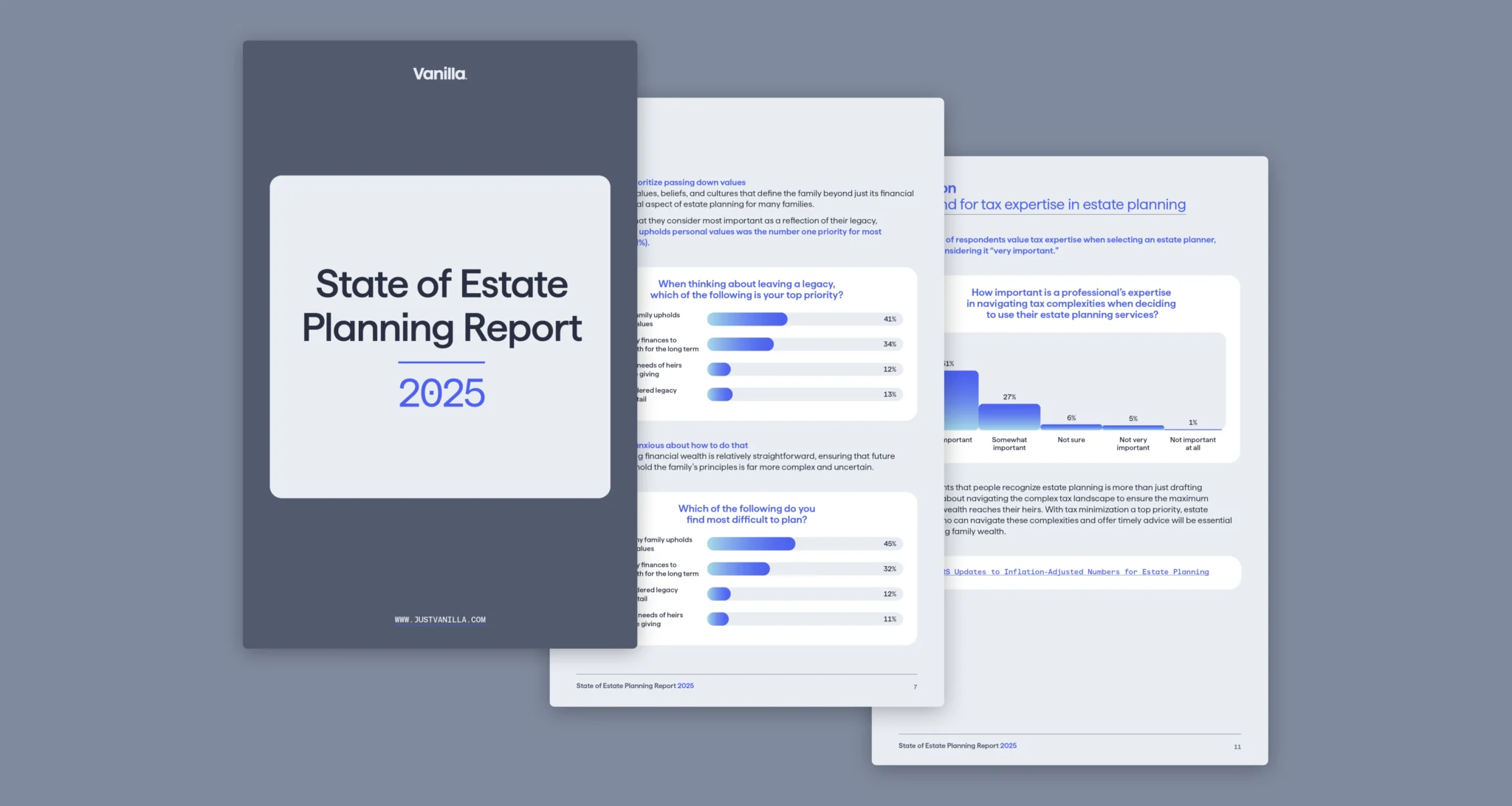 Madison Eubanks
Madison Eubanks
18 Stats to Know from Vanilla’s 2025 State of Estate Planning Report

In case you missed it, our recently released Vanilla’s 2025 State of Estate Planning Report is chock full of relevant facts and figures about what’s new and noteworthy in consumer mindsets around planning.
This annual survey of 1,000 US consumers is designed to unlock insights about how people view their families and values as well as the role of advisors and technology in the context of estate planning.
While the full report is well-worth a read, we also put together this skimmable roundup of some of the most important (and sometimes surprising) findings.
Read the complete, ungated State of Estate Planning report here.
Estate planning, family, and personal values
- An overwhelming 93% of respondents believe it’s important to discuss estate plans with loved ones, with over two-thirds (68%) deeming it “very important.”
Only 1% say it’s not important.

- Nearly half (48%) have doubts that the values they wish to pass on will be shared by their heirs.
- The top motivation for setting up a trust is “protecting assets from creditors or lawsuits,” with a striking 61% selecting this option.
Choosing trustees and advisors
- Sixty-five percent (65%) of respondents rank trustworthiness as the most important factor when choosing someone to manage a trust on behalf of beneficiaries.
Financial expertise was ranked most important by only 23%.
- Nearly 45% of respondents believe a family member who understands the family’s values is best suited to manage a trust.
Only 25% would prefer a professional fiduciary.

- Nearly 80% of respondents expect estate planning to be integrated into their advisor’s role, either directly or through collaboration.
- More than half view estate planning as a non-negotiable service.
Only 7% prefer to handle estate planning separately from other financial matters.
- Over 60% of respondents are skeptical that financial advisors can consistently outperform the market.
- Half 50% of respondents prefer a flat fee for estate planning services.
Estate planning and taxes
- Nine in ten respondents (90%) are concerned about the impact of taxes (e.g., estate taxes, income taxes on IRA distributions, capital gains) on the assets they plan to pass on to their heirs.
- Eighty-six percent (86%) of respondents believe that minimizing tax liability is important.
Fifty-seven percent (57%) view it as “very important.”
- Nearly 90% of respondents believe that tax expertise is important when choosing an estate planner.
Despite these high levels of concern, less than half (42%) have taken proactive steps to minimize taxes through planning with an advisor.

- A majority of respondents (57%) believe the next presidential administration will have a “significant” impact on estate tax laws.
Only 3.5% believe it will have no impact at all.
- Over half of respondents are either unaware (29%) or only vaguely aware (26%) of the upcoming 2026 changes to the federal estate tax exemption.
Estate planning and technology
- Nearly 75% of respondents would be more likely to use an online estate planning platform if it offered personalized guidance from a live advisor.
- Only 9% would choose an online wealth management platform over a traditional financial advisor because they want the ability to manage their accounts independently.
- Eight in ten respondents (80%) are comfortable with their advisors using AI or digital tools to draft estate plans, provided there is professional oversight.
Forty-one percent (41%) are “very comfortable” with the idea, especially if there is professional oversight of the process and it doesn’t increase costs.

What are the implications of the consumer sentiments revealed in this survey, and what actions do advisors need to take? Read the full report to find out.
Published: Dec 10, 2024
Holistic wealth management starts here
Join thousands of advisors who use Vanilla to transform their service offering and accelerate revenue growth.
